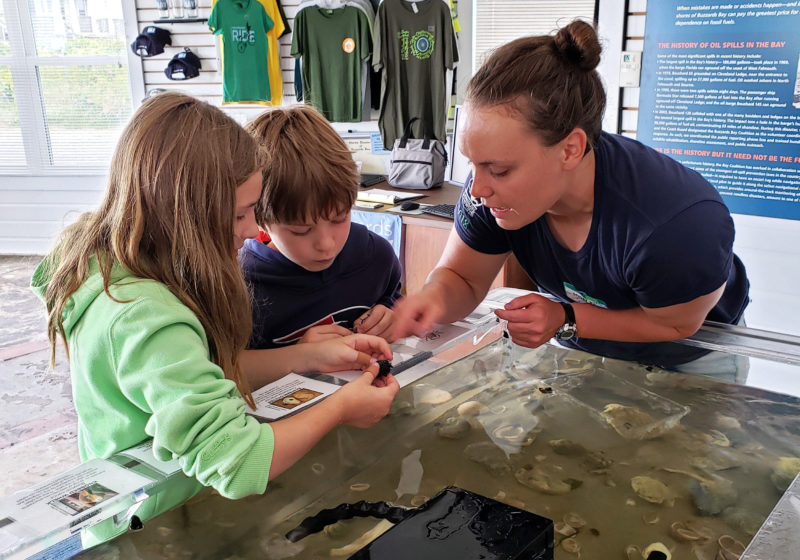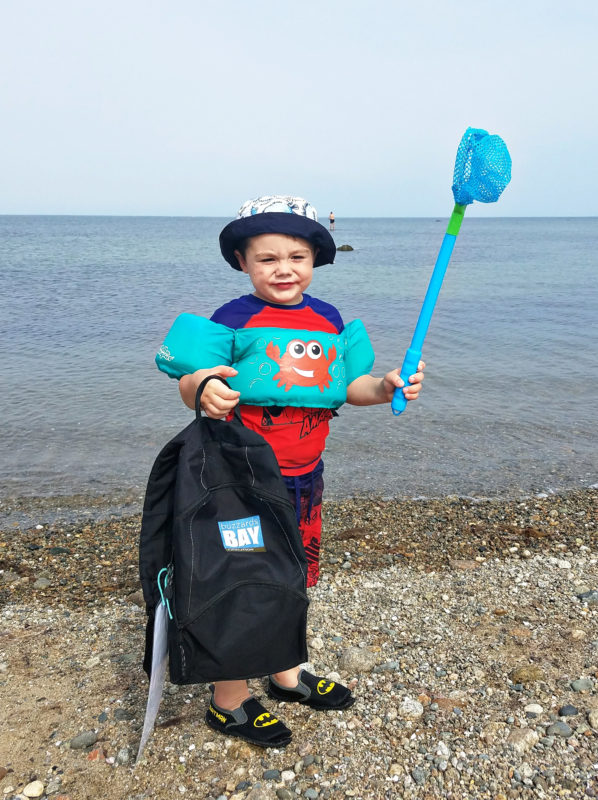First summer of activity wraps up at Horseneck Point Life-Saving Station
The Horseneck Point Life-Saving Station has lived many lives: since its retirement from active service in 1913, it has been a restaurant, a bar, a clam shack, an ice cream parlor, a private residence, and an environmental visitor center.

TerraCorps service member Emily Boardman examines a hermit crab in the touch tank with young visitors to the Life-Saving Station.
In 2009, the Westport Fishermen’s Association (WFA) restored this over 120-year-old station to its historic appearance and took over its curatorship from the Massachusetts Department of Conservation and Recreation (DCR). When the WFA merged with the Buzzards Bay Coalition in the fall of 2018, the Coalition made a promise to continue WFA’s mission for this stage in the station’s long life: educating visitors about the Station’s fascinating history, and conveying the urgent water quality issues facing the region.
As the summer of 2019 comes to a close, so too does our first summer of hands-on learning and activity at the Life-Saving Station and its learning center. On Wednesdays, Thursdays and Saturdays between the end of June and the end of August, the station saw nearly 600 visitors of all ages. Kids and adults alike were delighted by interacting with sea stars, crabs, snails and small fish in the learning center’s touch tank.
Families were able to check out “exploration backpacks” to take on outdoor adventures, which held a bucket and net, sand sifter, magnifying glass, binoculars, scavenger hunts, and guides of places to explore in the local area. These backpacks, and a memorial bench for the station, were donated by Bill, Jane, and Josh Napolitano.

Kids who visited the Life-Saving Station were able to check out “exploration backpacks” full of equipment to take on outdoor adventures.
Thanks to a partnership with the Massachusetts Department of Conservation and Recreation, the station also hosted DCR interpretive ranger Cory Farrelly, who shared the work and message of DCR and the Coalition.
For Life-Saving Station staff and volunteers, one of the most delightful experiences was hearing from visitors who had been visiting the Horseneck Beach campground and Gooseberry Island for decades, and have watched the Life-Saving Station transform over its lifetime. Many of these visitors were stopping into the station for the first time ever, drawn in by its wide-open barn doors.
Though the Horseneck Point Life-Saving Station closes for the season on August 31, the Coalition will continue to host programs out of the learning center throughout the fall, including the first of the fall Itty Bitty Bay Explorers events and a Beach Yoga series. Stop by one of these events to enjoy a tour of the Life-Saving Station, and to take in the beauty of Westport in the fall!